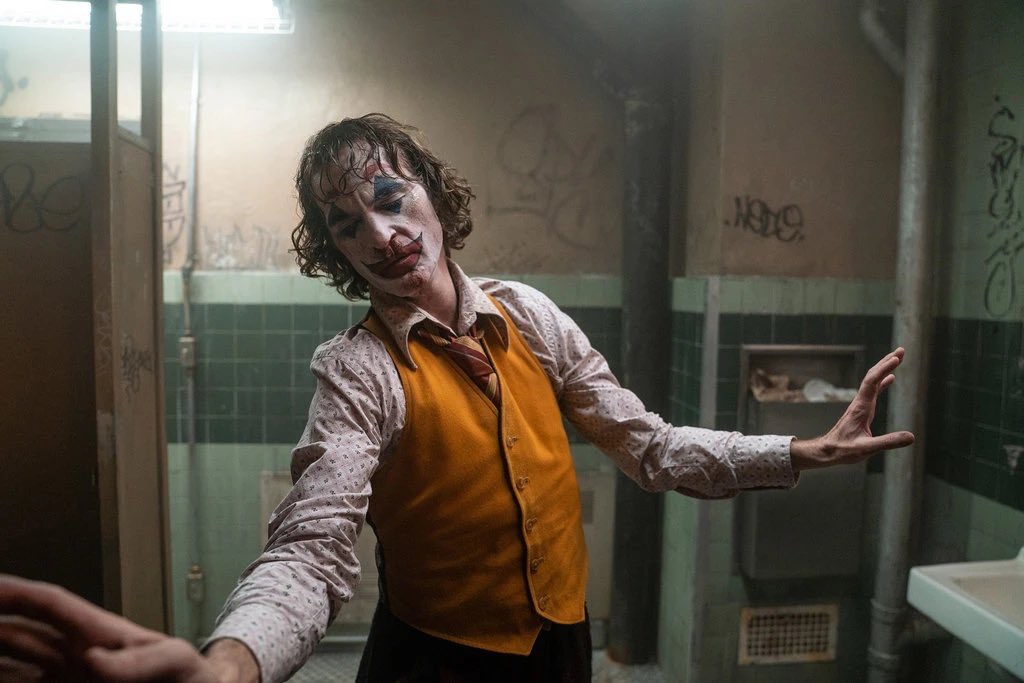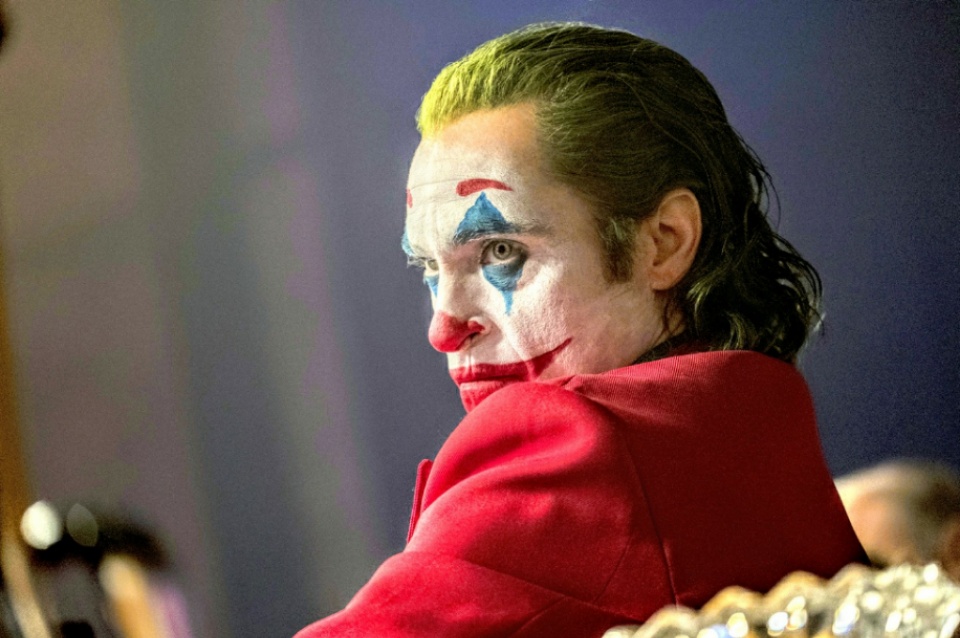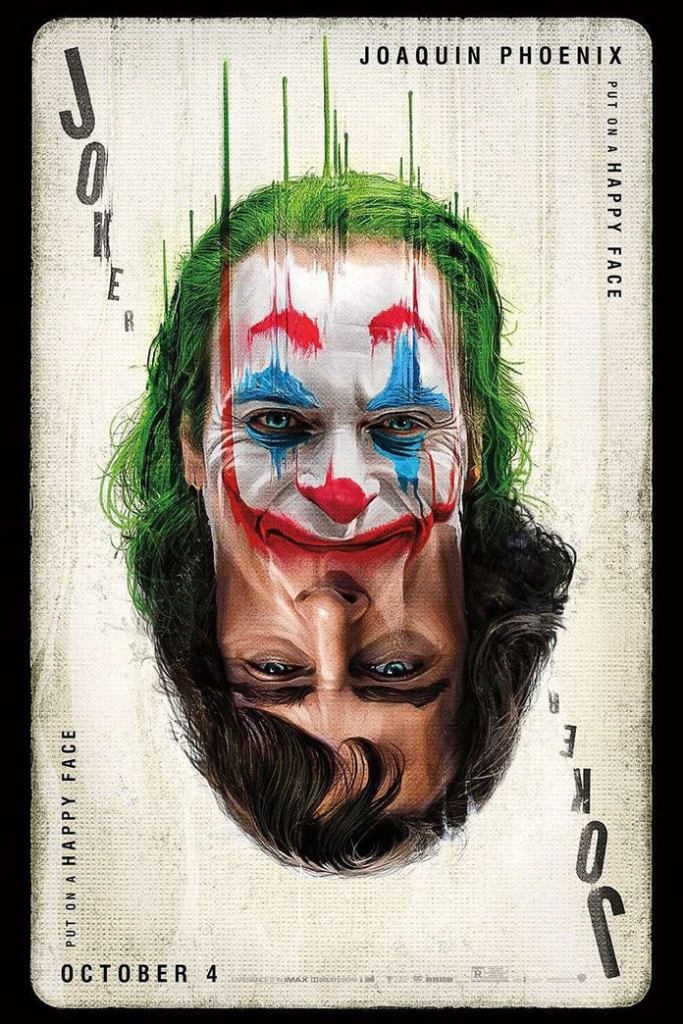Sean and I both saw Joker at TIFF last month, at back to back screenings. We met up for lunch afterward (I believe we had a slight pause before seeing the Harriet Tubman movie) because boy did I have thoughts, comments, and questions, which I tried not to yell too loudly because: spoilers.
Joaquin Phoenix plays Arthur Fleck in a totally new but not entirely unfamiliar way. He works as a (semi) professional clown but dreams of becoming a stand-up comic. He’s not a great clown; he gets a lot of complaints. Maybe it’s because he breaks clown rules. Real clowns prefer to paint their faces in large circles because pointy-ended makeup gives kids a subliminal fright. As you can see, Arthur paints both eyes and mouth with sharp ends, normally prohibited in the clown community. But there was another rule-breaker, historically. His name was John Wayne Gacy, and Joker’s makeup is likely a subtle nod toward this man, a serial killer who entertained kids on the side as Pogo the clown. He also raped, tortured and murdered at least 33 teenage boys during the 1970s.

Arthur has a complicated relationship with his mother (Frances Conroy), with whom he lives. She’s not well, and depends on his support, meager as it is. She may be somewhat delusional because she writes long-winded letters about her poor living conditions to one-time employer Thomas Wayne, hoping his outrage will be enough to improve their circumstances. Until such a time, mother and son alleviate their suffering by cuddling up every night to watch their favourite late night talk show, Murray Franklin (Robert DeNiro).
Arthur is dangerously thin, but people aren’t just uncomfortable about his physicality. There’s also the laughing. He laughs often, and inappropriately. It’s a neurological condition, and he hands out cards to strangers to ease their discomfort when his laughing goes on just a little too long. Still, it gets him into trouble. Joker’s laugh is iconic, and Phoenix taps into something so deranged, so haunting, it’ll nail your feet to the floor. The laugh alone justifies casting him. It is distinctive, different, perfect. Unforgettable. Scary as hell. It sounds almost painful for Phoenix and it sent shivers down my spine.

Meanwhile, Gotham City is a total shit show. Garbage is piling up everywhere, home to super rats that terrorize the city. It’s never explicitly stated, but I’m guessing it’s 1981. The clothes are very late 70s/early 80s, you can still smoke indoors, and both Blow Out and Zorro The Gay Blade are playing at the movies. People are starting to agitate. The city’s becoming increasingly dangerous. There’s an undercurrent of discontent. It isn’t safe. Arthur gets robbed, jumped, beaten. There’s a certain electricity in the air. We all know Joker to be a villain, but the way things are going, these people may see him as more of a hero. Kill the rich – that’s their slogan. Not a great time to be the Wayne family. But is Joker the symbol this rebellion needs?
Arthur Fleck is nobody’s idea of a hero. He’s a mentally unstable man. He’s been in psych wards. He takes 7 different kinds of meds but still feels bad all the time. He keeps a joke diary filled with suicidal thoughts. “The worst part of having a mental illness,” he writes, “is people expect you to behave as if you don’t.” I’ve lost count of how many Jokers we’ve seen on screen now, but it truly feels like Phoenix doesn’t fuck with any of them. Truly, he and writers Todd Phillips and Scott Silver have created Arthur/Joker from the ground up. He is an amalgam of childhood trauma, torment, debasement. You really get the sense that if anything had gone even just a fraction differently, you’d end up with a different guy. Arthur’s natural reaction to the world isn’t insanity or violence or evil. He genuinely seems to want to bring joy to the world. He wants to make the people laugh. He is searching for a way in. He is searching, I suppose, for identity. For purpose. But for one reason or another, this guy just keeps slipping through the cracks. There’s nobody to help him. If one person had reached out when he needed it, this would be a very different story. And I suppose that’s why this movie is so good. It doesn’t feel like a comic book movie, it feels more like Taxi Driver. It’s a character study. This man feels unpredictable, and yet we know his ending. There is a surprising amount of tension for a movie that can really only end one way. But director Todd Phillips creates this constant sense of swirling stress and anxiety, this emotional tautness by repeatedly having Arthur reach out. He doesn’t want to be a weirdo, or a loner. He wants that same connection that we all do. But society is keeping its distance. He’s isolated. He’s forgotten and ignored. We have countless opportunities to save the world from the Joker but we never do – we fail Arthur Fleck. Does the film show empathy toward him? I suppose it does, in many ways. Or at least to people who fall through the cracks. Personally, I had a hard time feeling empathy toward his first victims. Arthur is a complex man living in some complex times. There is no single reason that tips him over into villainy. There are just an awful lot of cracks in the pavement. A chasm is bound to open up, which is maybe the scariest way to look at it. There is no vat of acid. Joker’s descent into madness, or crime, or evil, or whatever you want to call it – it’s grounded in reality.

Comic books and super hero movies tend to deal in quite general archetypes of good and evil. This makes the characters instantly recognizable as hero or villain, but it also serves to put a distance between audience and character because there is little to relate to. Todd Phillips’ Joker is much more layered, which means at times you’ll root for him, and other times you’ll be disgusted by him. It’s a push-pull that few actors could pull off, and it’s why Joaquin Phoenix, already one of this generation’s biggest and truest talents, deserves an Oscar nomination, and as of right now, I’d say even the win.
Joker, however, is not just a great performance. It’s a wonderful, thoughtful film, a send up to gritty character studies of another era. Todd Phillips has said “The goal was never to introduce Joaquin Phoenix into the comic book movie universe. The goal was to introduce comic book movies into the Joaquin Phoenix universe.” Goddamn I love that quote. I think it shows great appreciation for Phoenix’s body of work. This isn’t just another origin story, this is a deep dive into a man’s psyche. Phoenix tends to gravitate toward the broken and tormented, but they’re not one-dimensional. They are faceted individuals. Different actors have interpreted Joker in many ways: a fiend, a terrorist, a thug, a psychopath. But Joaquin Phoenix goes with something else: human.

Edit:
So I wrote all of that last month, after seeing Joker at TIFF. Since then, certain media outlets have tried to whip up a story about possible violence at Joker screenings and whether this movie sends a terrible message. I have wondered whether I should contribute to that noise at all but find that I do have something to say about it. Feel free to debate.
- Does the movie treat the Joker too sympathetically? In a word: no. This is not the Joker from Batman comics. That Joker doesn’t exist yet. Arthur Fleck is a sad man with mental health problems. When he kills, he has a reason. None that justify the violence of course, but it’s not senseless or diabolical or insane.
- Is Joker gratuitously violent? Actually, no. There is some violence, of course, but compared to other films, relatively little – in fact, probably relatively little even compared to other Batman movies. This is primarily a character study, so a lot of the interesting stuff is introspective, in his head, as his character transforms.
- Is the film inviting violence from incels? Of course not. An incel, if you haven’t heard, is a man who believes himself to be INvoluntarily CELibate – ie, no one will sleep with him, and he blames it on some big female conspiracy. Incels have found each other in chat rooms and encourage each other to be nasty and wrong and gross, and angry toward women generally, and perhaps even violent toward them. They somehow think they are owed sex and even more confusingly, plot revenge for all the sex they aren’t getting. And somehow no one stops to think: this is why. This is why no one wants to date me. I am a creep. Women get a creep vibe from me, and they stay away because they sense I am an angry, dangerous dude. Maybe I should try…being nice? But the situation in the Joker movie doesn’t apply. There’s a woman he fixates on but even a criminally insane Arthur Fleck doesn’t blame her for his failures. He’s not an incel and I don’t think they even tread into that territory, so people trying to associate that with the movie are just being deliberately inflammatory.
- Let’s remember that this movie is only the Joker’s birth. He’s a Joker fetus. He isn’t a criminal mastermind. There is no Batman yet; Bruce is still just a boy and Arthur is just a man finding his identity on the dark side. Where society has rejected him, the underbelly accepts him and raises him up. Of course it’s intoxicating. And of course it’s wrong. But if we’re talking body count, he’s responsible for only a fraction compared to Blade, or The Bride, or Rambo, or Walter White. And if we don’t protest every instance of violence, why are we targeting Joker? Especially when we could instead read it as a plea for early intervention, as a workbook for reaching out to the Arthur Flecks instead of merely condemning the Jokers.

Great review…
LikeLiked by 1 person
Very thoughtful review Jay. I’m looking forward to seeing this as Phoenix is a master at portraying the inner workings of his characters. If people are getting violent at screenings that’s because there’s a problem with them, not the movie, and you know, any excuse.
LikeLike
Correction Phoniex is not a master but The Master.
LikeLike
Great post!
LikeLike
I heard that the New York Times was somewhat scathing. In fact, many news agencies were unimpressed by The Joker. Often I take what they have to say with a grain of salt. The discourse about it has been blown out of context in some quarters. For one The Joker is a fictional character and while this reimagined version of an iconic character might not sit well with some, it’s disturbing worldview in a lot of ways is relevant with what’s going on in our little universe. Sort of, kind of. Maybe we should all look in the mirror too!?
LikeLike
Without having seen it yet I’m intrigued by Robert DeNiro as a late night talk show host, and you probably picked up on it too that it seems like a reference to The King Of Comedy.
I’m not sure how big DeNiro’s role is, but his presence seems like yet another layer: considered one of the best, if not the best, of his generation, he’s symbolically stepping aside.
It’s also very clever on the part of the filmmakers to set a film that deals with so much that’s contemporary decades in the past–a reminder that today’s problems have historic roots.
There’s a lot to think about here.
LikeLiked by 1 person
Nice review, Jay. As my most trusted movie reviewer, this puts my mind at ease a bit. I read another review saying the film was irresponsible in the way it didn’t seem to condemn the narrative of an isolated white man lashing out in violence, in this culture where that narrative is all too common. And it seemed to make some good points, at least from my perspective where I haven’t actually seen the film yet. Got me thinking about the power of film as an affecting art form and all that. But it’s nice to read that this isn’t necessarily the case from you! Regardless though, I think all the discussion has emphasized for me once again just the need (my need) for more narratives that aren’t about white men, cuz they really do still seem to dominate movie culture. I’m rambling now. Thanks again for your thoughtful words, Jay, I’m still definitely looking forward to seeing this and seeing Phoenix once more- he’s amazing.
LikeLike
Thank you for your thoughts on this one. I’ve been looking forward to seeing this and how it deals with the mental health issues. Yet at the same time all the controversy and worry surrounding the movie possibly inciting violence has made me more anxious than usual to go see it in the theaters.
LikeLiked by 1 person
This sounds like a fantastic film with an amazing performance! It’s good that it’s not gratuitously violent as well, cos I was worried about that. Excellent review! I think you covered the issues surrounding this film really well too!
LikeLike
I love how you’ve broken down each aspect of the Jokers character and how and why he evolved the way he did. Awesome review Jay! 😎
LikeLike
It sounds amazing
LikeLike
Wow… Powerful review. Not too many Joker fans here in Denver/Aurora CO, but you sure have written a great review!
LikeLiked by 1 person
Wow.. great review. I agree with you about the violence. It’s so odd because it’s shot in a way that makes it feel more brutal than what you see. Rambo:Last Blood was a bazillion times more violent than this, i feel like it’s just the creepyness of the character, the way the film is shot, and the acting. We are scared of this man as he projects things that are happening in today’s world as well. No one is scared of a regular action flick because common sense dictates you know it’s not real..well some people’s common sense ha! For me, whether you love it or not, it’s definitely a viewing experience
LikeLike
I was on the fence about seeing this one. Your review tipped me over on the seeing it side and I’m glad it did. I thought it was an excellent film. I loved the slow burn building up tension until something had to blow. Oscar contender in several categories for sure.
LikeLiked by 2 people
Brilliant, brilliant, brilliant review! 😀
LikeLiked by 2 people
The only joker post I needed to read. Thanks, Jay
LikeLiked by 1 person
Pingback: Let’s talk about Joker — ASSHOLES WATCHING MOVIES – Experience Film
Great review of one of the best films I have seen all year. I don’t believe this is a film that trivialises mental illness at all. It is disturbing because, especially given it is set in the 1980s, it shows that severe lack of care shown to people on the edge by the system. In Victorian times people with mental issues were thrown in dank asylums to rot. I recall seeing a documentary about a Staten Island asylum in the 1960s and things had not improved. To make such powerful points in a comic book origins story really sets the film apart from most DC film adaptations. Of course, Phoenix is unbelievably good too!
LikeLike
Great review. Good thoughts.
LikeLike
What a beautifully written review, Jay. I haven’t seen The Joker yet, but have a few thoughts: Joaquin Phoenix is one of the most brilliant actors of our time. This role really gave him the opportunity to develop a fascinatingly complicated character. I’m generally not a fan of comic book movies (so silly or flashy or overly packed with famous actors or CGI or all of the above). But this film is deep and dark and the immersion into the life and mind of a mentally ill man who society perhaps could have helped seems realistic and disturbing and uncomfortable to watch, which I imagine was the intention.
LikeLike
“Joker’s descent into madness, or crime, or evil, or whatever you want to call it – it’s grounded in reality.”
And this is exactly why this movie is exceptional!
LikeLike
Right you are, wonderful writing. After I watched it, I was sad for a week. I couldn’t shake it away. Sad for him and all the many who are like him and for us as the society.
If this were just a film like many others, titled Arthur, for example, it wouldn’t create such a ruckus. Its glory is that it’s called Joker and America, and with it the world, thought it was another super hero movie. In the industry where the first weekend counts, millions were tricked into watching a serious movie and now they are terrified and a bit pissed.
The rest of the glory goes to Joaquin. Oh man.
LikeLike